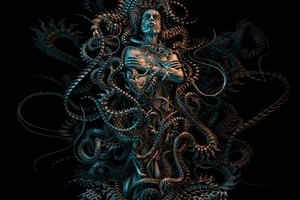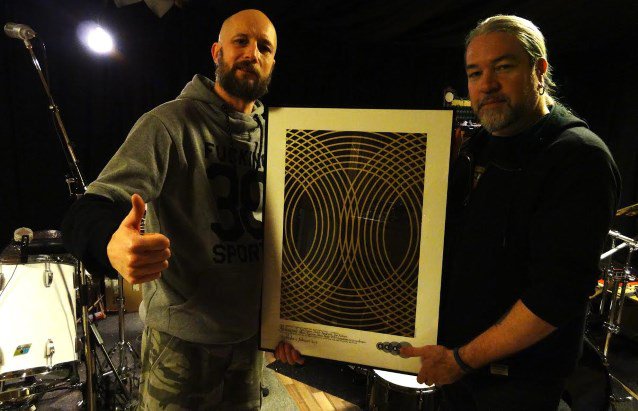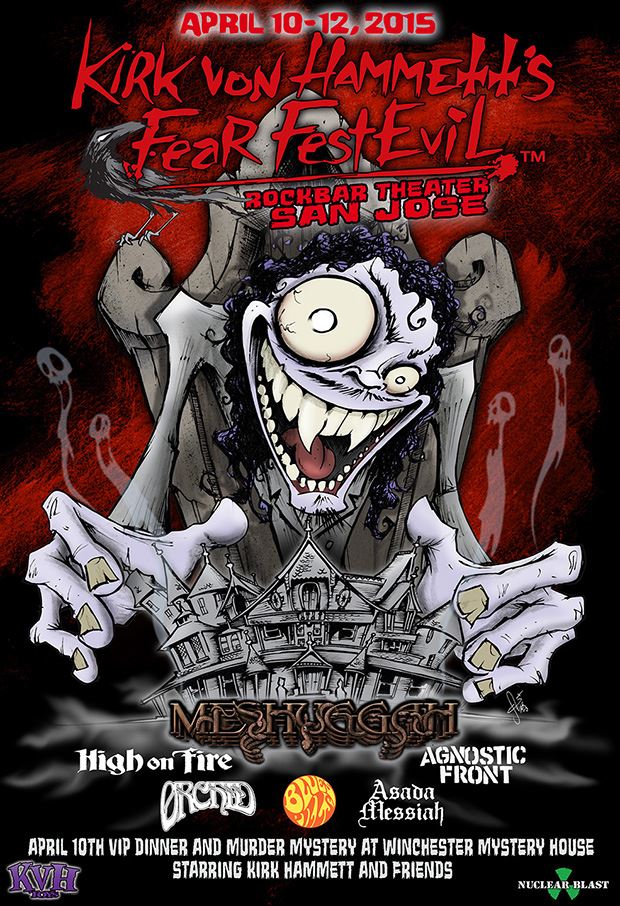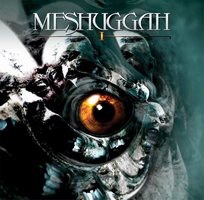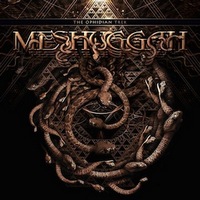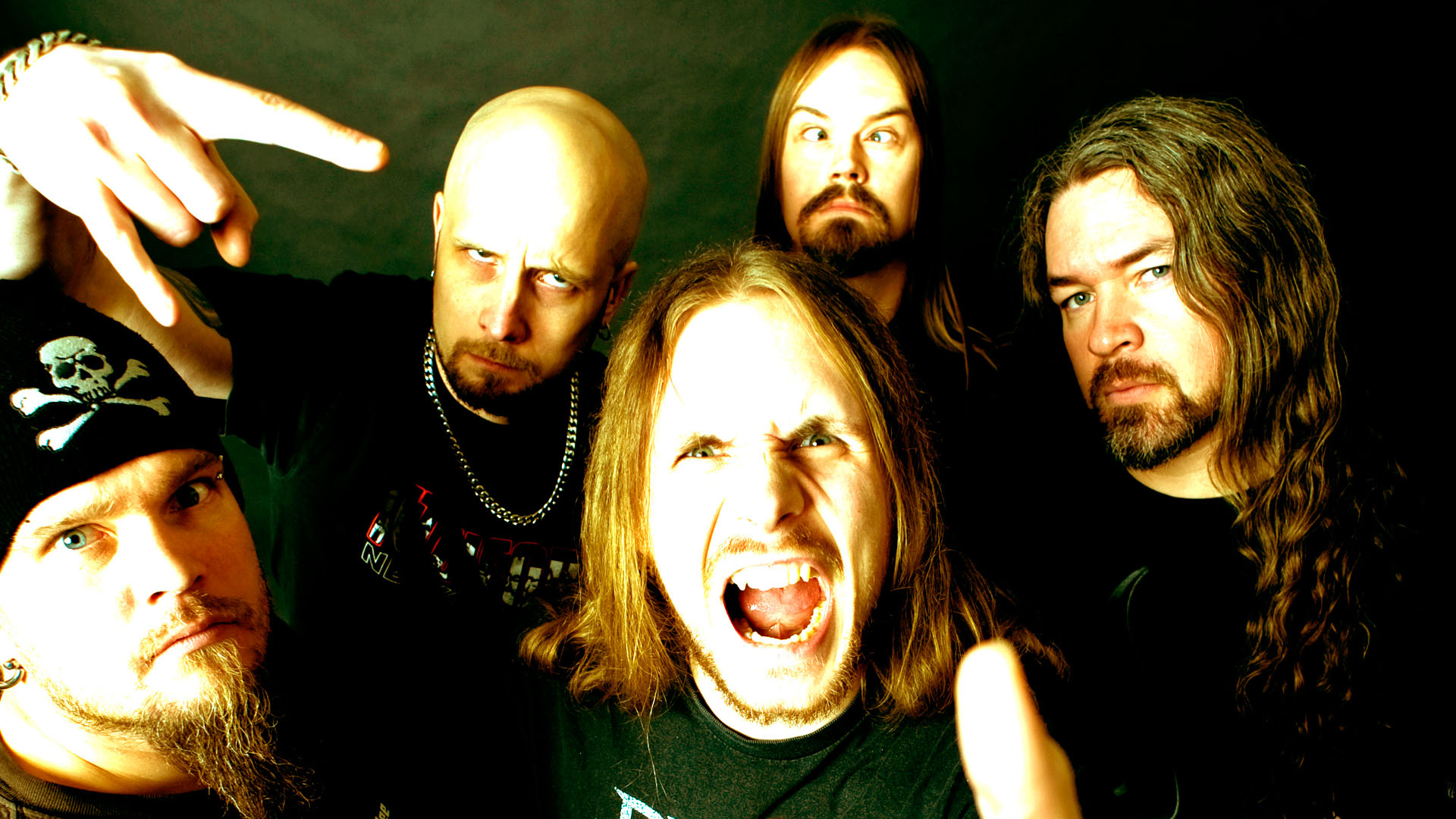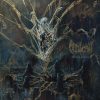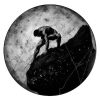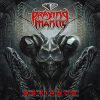Meshuggah – Combustible.Beings.Create
Thursday, 28th March 2013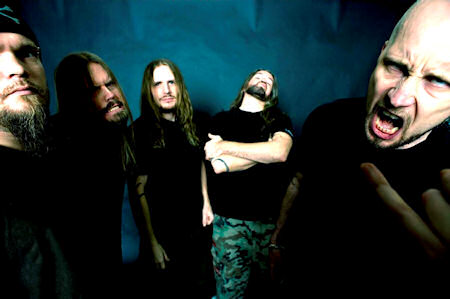
(This content originally appeared on Blistering.com)
The first major release of ’08 (sorry kids, Bullet For My Valentine doesn’t count), Meshuggah’s obZen has been greeted with some major buzz from both fans and industry folk and why shouldn’t it? The Umea, Sweden quintet have helped re-write the book on modern extreme metal, creating a wave of woe-be-gone copycats and staccato riffing that is now standard fare in today’s metal scene.
We all know the story behind the seminal Destroy.Erase.Improve and Chaosphere albums and felt a tad polarized about Nothing and the streaky Catch Thirty-Three, so obZen has to deliver in order for Meshuggah to keep its leg up on the competition.
For the most part, obZen delivers, especially in the form of “Combustion” and “Bleed,” two of the most vicious and progressive songs the band has written. The latter might be the heaviest song of the year, the test by which all rhythm guitar players will be measured (you try doing those triplets, pal). “This Spiteful Snake” and “Pravus” are marked improvements on the chaotic template the band has been trying to refine this entire decade while slower, more concerted tracks like “Electric Red” and “Lethargica” may continue to confound and suppress the band’s fanbase. These two songs never get out of first gear and are obviously inferior to the aforementioned tunes.
Nevertheless, there’s always tons to talk about with Meshuggah and rhythm guitarist/hockey enthusiast Marten Hagstrom phoned in on a crisp March afternoon to talk about their upcoming April/May tour with industrial metal lords Ministry, the new album, the mental (and physical) hurdles the band’s music presents, and the vastly underrated None EP. Here we go…
Blistering.com: How did this pairing with Ministry come about?
Marten Hagstrom: Basically, they got in touch with us and asked if we wanted to support them on their last their tour. It seems like a pretty cool tour to be on. It’ll be interesting because we both have that aggressive thing going, where they are very straightforward and we are not, so it’s kind of a little bit of the opposite end of the scale.
Blistering.com: You guys are getting what, 45 minutes for this tour, right?
Marten: Yeah, I think it’s 45 minutes, I’m not 100% sure. We’ll be playing two tracks off the new album. We have an opening set and a headlining set, but it’s kinda difficult. Obviously, we’d like to have a little bit everything. We’ll do something off Destroy, something off Chaosphere, Nothing, but I don’t know how much from each record, but I do know that we’re aiming for two or three songs off the new record.
Blistering.com: Early reports had you going to back to the style of Chaosphere, but it appears obZen is a mixture of the last three albums. Do you agree with that assessment?
Marten: I wouldn’t say that it was a conscious decision to go for anything in particular. If you go back and look at what we’ve done throughout our career, most of our albums have been a reaction to what we were doing previously.Destroy.Erase.Improve is a dynamic, evolved thrash metal album, where Chaosphere not being so dynamic and in your face and aggressive, and Nothingwas not like that and was droning. Coming off Catch Thirty-Three which centers around a nightmare at 47 minutes, we were looking for a more aggressive and dynamic approach along with a live vibe and that made it inspiring.
Blistering.com: One of the cool things about the album is how it sounds like it it split up among the songwriters. You can almost get a feel for who wrote what. So, what did you write?
Marten: I wrote entirely “Pravus,” “Lethargica” and “obZen” and me and Thomas (Haake, drums) co-wrote “Electric Red” and “This Spiteful Snake.”
Blistering.com: “Bleed” is arguably the best thing you’ve done and you put it out on your Myspace before the release of the album. In terms of performing that live, how much of a test of endurance is this song going to be?
Marten: Actually, we’re aiming for it. It’s going to be a bitch (laughs) from a guitar point of view and drum point of view. That song is really special in that way from a technical point and the aspect of memorizing it because the song rhythmically, is one small figure and that small figure is evolving through the whole song. There are these minute changes to doing something very monotonous for a big period of time. There are more difficult things that one: you have the stamina the part, which is being able to go all the way through it because it’s demanding on the pick, especially the thumb muscle which gets prone to cramping if you overdo it. The second one is obviously is keeping track and not getting lost in the hypnotic parts when it gets to be so much of the same in the minute parts.
“Bleed” is probably the song that instantly says something to the listener, but I think most of the songs have a similar quality, but not to that extent. Like “Combustion” is reminiscent of old-school thrash, but in our way in 2008. You have “Lethragica” which is a slow and sludgy song, but very different. But this album is one of those albums where we’re going back to the dynamics of the parts in between the songs and getting them to have an identity all their own.
Blistering.com: You mentioned the endurance factor with some of these songs, so how much of a factor is the 8-string guitars on your songs, new and old?
Marten: From a technical point of view, you get an additional string. The measure of these strings is pretty big, close to a baritone guitar. It’s always the mind that messes things up. What makes it tough is that the ideas that come out of your mind naturally are the ones that are making you suffer later to play that shit. It’s secondary; it has to be dealt with. We’ve been benefited a lot from the 8-string from a songwriting standpoint.
Blistering.com: “This Spiteful Snake” is one of those songs with a lot of dynamics to it. What’s the background behind this one?
Marten: That song is different in a lot of ways. Every song has a clear expression of what its like all the way, whereas “This Spiteful Snake” is a bit of transformation all the way through and it’s reminiscent of some of the stuff we used to do a long time ago. We always felt “This Spiteful Snake” was like a song we had off the None EP called “Humilative.” It starts in one way and finishes off the same way, but in the middle it goes off and never comes back.
Blistering.com: You’ve had Dick (Lovgren, bass) in the band for about 3-4 years. How does he relate to your past bass players?
Marten: He’s a perfect fit. When we parted ways with our last player (Gustaf Hielm), we felt that we needed someone who could handle the technical aspect and handle the attitude needed to play with the band and he did that right away. He nailed it right away. We felt straight away because he was nailing it as far as the concept and understanding it, he could also deliver it in a way because there’s a big difference in recognizing where to play something and performing something properly. He’s been terrific that way.
Blistering.com: Around the time of the Nothing album you had the idea of making everything sound like a bass. The new album would suggest otherwise, so will you revisit that approach somewhere down the road?
Marten: Maybe, but it’s a weird thing that’s going on. A lot of people have been asking us through the years that why does the bass guitar not really do what the guitars are doing and why are the guitars are doing the leading? It seems to be the general opinion of how we sound. The truth is, if you mute out the bass on the album, you’ll see the guitars are more deriving from the sound of the bass. What it contributes to the sound, it makes it very rough and distorted and makes the Meshuggah [sound]. Even though it may not appear that way, it’s a big part of our sound.
Blistering.com: I think the None EP was the real turning point in the sense of Meshuggah developing its sound and was when you joined. Take me back to the time period around ’93-’94 when you exploring that.
Marten: They used to have Fredrick (Thordendal, guitars) and Jens (Kidman, vocals) sing and every other song they’d swap. They told me they wanted a songwriter. Thomas and I had been playing for practically our whole lives, since we were kids, so when Meshuggah started up, it was the first time we didn’t play together. When I started with them, it was trial and error for both them and me. I think they felt they wanted to go in a new direction but wanted to keep some of what they built. It was a way for us to find out where we were in this new collaboration of people. All the sudden, when someone is added to the songwriting process, you start to find out how it will work out.
Finishing that None EP, I think that coming out of the studio we realized, that shit, not only did we do a record that we felt was pretty good, but we achieved something that hadn’t been done before in the order of a vibe and sound that was our own.
Blistering.com: Sticking with that era, you can trace the growth of three elements from that time period: the band, Nuclear Blast and producer Daniel Bergstand. Do you think it’s interesting that 13, 14 years removed from all of that, all three of you are now prominent names in the metal scene?
Marten: It’s funny, because I know we know that’s the way it works. Everyone has evolved and grown, but in order to really assess something like that, you almost have to finalize it where we’ve broken up, Daniel has retired and Markus (Steiger, NB head) has sold the label, then you can actually see the results. There’s still so much. It’s amazing because you’re so blind to what you’ve actually achieved.
I know that when we re-signed with Nuclear Blast in ’05 for the Catch Thirty-Three album, we were talking to Markus and he said, “I think out of all the people I started Nuclear Blast with, the only people that are left are two people. Nobody else from the start.” From ’91, when Contradictions Collapsewas released, there are two bands left, us and I think Pungent Stench.
Pages: 1 2











